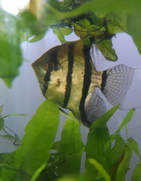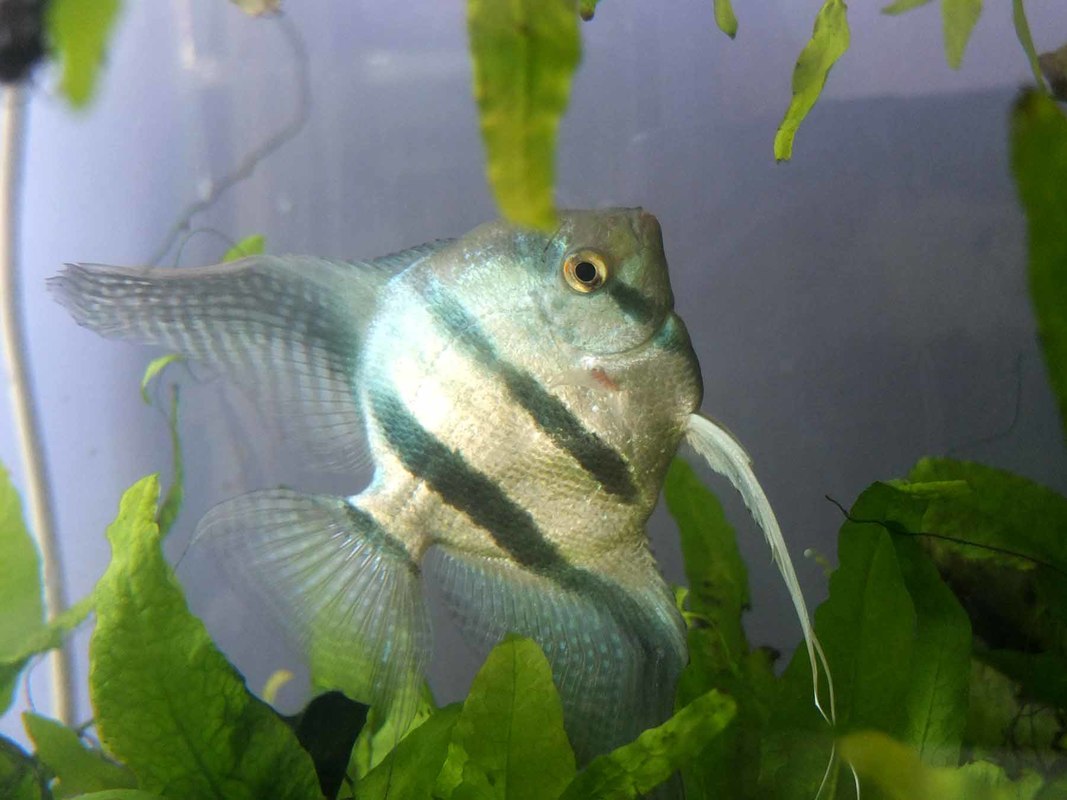
Observing his aquarium, Mark Robertson realises that love and lust are powerful emotions, no matter what the species.
By Mark Robertson
THE aquarium is a wondrous device. Not simply a decoration for the home but a tiny biosphere. The key to its success is a careful balance of natural processes – light, oxygen levels, plant growth, food and population density. When all is well, the little planet will thrive, but when the balance is upset the result will be a rotting mess.
Our planet operates under the same immutable natural laws – we humans tend to ignore this. Break the rules with over-population and pollution and face the consequences: extinction.
One of my tanks is a model of peaceful co-existence. The discus fish get along with only mild displays of greed and dominance. The other tank is the polar opposite – more drama than a season of Game of Thrones. It is home to a pair of angel fish, although my charges behave more like devils. It wouldn’t surprise me if they sprouted horns and started waving around pitchforks.
I started with a trio of adolescents, laterally compressed bodies, long fins and black vertical stripes. The angel is a classic tropical fish, native to the Amazon. Their form is perfectly adapted to sit among the reedy bankside vegetation, waiting to pounce on small aquatic creatures.
For the first few months my angels matured peacefully. Two females – their silver tones actually a mix of gold and mauve – and one male, a rare blue colour form, the silver overlaid with a metallic green/blue sheen.
As they matured, it was if an unseen switch had been flicked. The sex hormones kicked in and serious trouble was brewing. The females took up positions at either end of the tank with the male in the middle, trying to decide which of the ladies he preferred. One was desperate for his attentions, the other aloof. Of course he decided on the latter, and havoc ensued. The other female was attacked mercilessly until she was cowering in a corner. I rescued her and she now lives happily with the discus community, although I sometimes see her gazing longingly through the glass at the object of her desire.
The happy couple then began the complex courtship ritual, flicking fins, locking jaws and wrestling. Soon a plant leaf was chosen and carefully cleaned by pecking and mouthing. The work was shared evenly, with the other guarding against any intruders. (At that stage there were several rainbow fish in the tank.)
Finally the spawning dance began. The female would glide with incredible precision up the leaf surface, depositing tiny amber-coloured eggs. Once a line of eggs had adhered to the leaf, the male would follow along, fertilising the eggs. This was repeated until the leaf was covered. Over several days one parent would fan and mouth the eggs, cleaning away any foreign muck and providing oxygenated water. The other hovered nearby, patrolling for interlopers, instantly transforming from loving parent to aquatic attack dog.
Angel fish are members of the cichlid family, characterised by a high level of brood care. This ensures a high survival rate of the young. Most other fishes simply spray millions of eggs into the water and hope for the best. Some cichlid species will dig nests or lay eggs inside caves.
Once the babies hatched, the parents guarded them zealously. If one managed to swim away the parent would scoop it up in their mouth and return it to the wriggling mass of siblings. Of course this became more difficult as the youngsters became more active. It reminded me of the term “herding cats”.
It soon became apparent that rainbow fish love a meal of baby angels so I tried to catch the speedy predators, with disastrous consequences. The babies were eaten and I ended up in casualty with a badly cut thumb after a glass panel broke.
The female was furious and vented her anger on the poor male. He was left cowering in a corner for a fortnight before he was forgiven.
In the months since, the pair have been constantly bickering. They both want to procreate again but cannot seem to synchronise their moods. They will aggressively display and lock jaws – wrestling – until one yields by tilting the head upwards, exposing the soft underbelly. This is a common behaviour in many species as a sign of submission. Dogs often do it, and young magpies being bullied by their peers will lie on their backs.
So what to do with my frustrated and violent lovers? Do I provide chocolates, flowers and mood lighting? Engage a relationship counsellor? I could reintroduce the other jilted female but that may simply inflame the delicate situation.
One thing is certain – love and lust are powerful emotions, no matter what the species.
Next time: What is big, black, beautiful and frightens Kiwis?
THE aquarium is a wondrous device. Not simply a decoration for the home but a tiny biosphere. The key to its success is a careful balance of natural processes – light, oxygen levels, plant growth, food and population density. When all is well, the little planet will thrive, but when the balance is upset the result will be a rotting mess.
Our planet operates under the same immutable natural laws – we humans tend to ignore this. Break the rules with over-population and pollution and face the consequences: extinction.
One of my tanks is a model of peaceful co-existence. The discus fish get along with only mild displays of greed and dominance. The other tank is the polar opposite – more drama than a season of Game of Thrones. It is home to a pair of angel fish, although my charges behave more like devils. It wouldn’t surprise me if they sprouted horns and started waving around pitchforks.
I started with a trio of adolescents, laterally compressed bodies, long fins and black vertical stripes. The angel is a classic tropical fish, native to the Amazon. Their form is perfectly adapted to sit among the reedy bankside vegetation, waiting to pounce on small aquatic creatures.
For the first few months my angels matured peacefully. Two females – their silver tones actually a mix of gold and mauve – and one male, a rare blue colour form, the silver overlaid with a metallic green/blue sheen.
As they matured, it was if an unseen switch had been flicked. The sex hormones kicked in and serious trouble was brewing. The females took up positions at either end of the tank with the male in the middle, trying to decide which of the ladies he preferred. One was desperate for his attentions, the other aloof. Of course he decided on the latter, and havoc ensued. The other female was attacked mercilessly until she was cowering in a corner. I rescued her and she now lives happily with the discus community, although I sometimes see her gazing longingly through the glass at the object of her desire.
The happy couple then began the complex courtship ritual, flicking fins, locking jaws and wrestling. Soon a plant leaf was chosen and carefully cleaned by pecking and mouthing. The work was shared evenly, with the other guarding against any intruders. (At that stage there were several rainbow fish in the tank.)
Finally the spawning dance began. The female would glide with incredible precision up the leaf surface, depositing tiny amber-coloured eggs. Once a line of eggs had adhered to the leaf, the male would follow along, fertilising the eggs. This was repeated until the leaf was covered. Over several days one parent would fan and mouth the eggs, cleaning away any foreign muck and providing oxygenated water. The other hovered nearby, patrolling for interlopers, instantly transforming from loving parent to aquatic attack dog.
Angel fish are members of the cichlid family, characterised by a high level of brood care. This ensures a high survival rate of the young. Most other fishes simply spray millions of eggs into the water and hope for the best. Some cichlid species will dig nests or lay eggs inside caves.
Once the babies hatched, the parents guarded them zealously. If one managed to swim away the parent would scoop it up in their mouth and return it to the wriggling mass of siblings. Of course this became more difficult as the youngsters became more active. It reminded me of the term “herding cats”.
It soon became apparent that rainbow fish love a meal of baby angels so I tried to catch the speedy predators, with disastrous consequences. The babies were eaten and I ended up in casualty with a badly cut thumb after a glass panel broke.
The female was furious and vented her anger on the poor male. He was left cowering in a corner for a fortnight before he was forgiven.
In the months since, the pair have been constantly bickering. They both want to procreate again but cannot seem to synchronise their moods. They will aggressively display and lock jaws – wrestling – until one yields by tilting the head upwards, exposing the soft underbelly. This is a common behaviour in many species as a sign of submission. Dogs often do it, and young magpies being bullied by their peers will lie on their backs.
So what to do with my frustrated and violent lovers? Do I provide chocolates, flowers and mood lighting? Engage a relationship counsellor? I could reintroduce the other jilted female but that may simply inflame the delicate situation.
One thing is certain – love and lust are powerful emotions, no matter what the species.
Next time: What is big, black, beautiful and frightens Kiwis?
